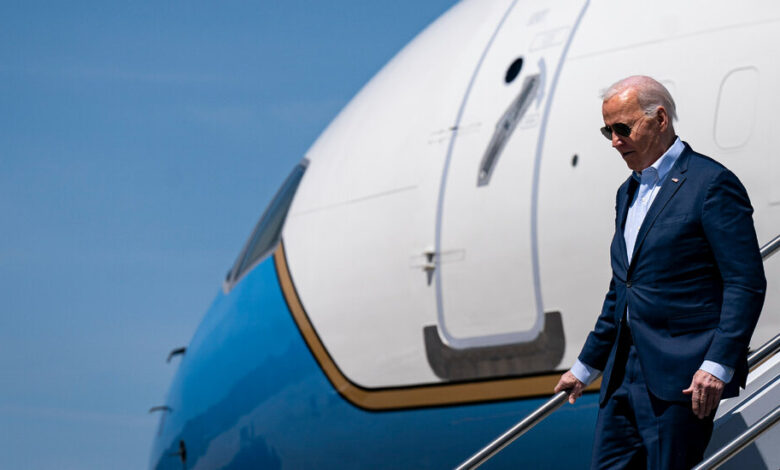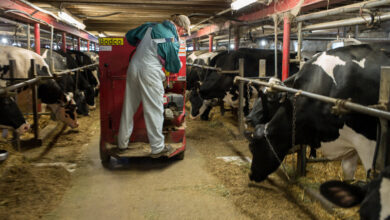Biden to Call for Tripling Tariffs on Chinese Steel Products

President Biden on Wednesday will call on his trade representative to more than triple some tariffs on steel and aluminum products from China, as part of a series of moves meant to help cushion American manufacturers from a surge of low-cost imports.
Speaking to the United Steelworkers Union in Pittsburgh, Mr. Biden will ask the U.S. trade representative, Katherine Tai, to increase tariffs to 25 percent on certain Chinese products that currently face tariffs of 7.5 percent — or no tariffs at all — U.S. officials said.
Mr. Biden will also announce a new trade representative investigation into China’s aggressive support for shipbuilders and other related industries, in response to a union complaint. And he will announce new initiatives to work with Mexican officials to block China from evading American steel tariffs by routing its exports through Mexico.
The moves represent an escalating effort by Mr. Biden and his aides to stop a flood of low-cost Chinese exports from undermining made-in-America products — and jeopardizing a central focus of Mr. Biden’s economic agenda.
Those exports, which often enjoy heavy subsidies from Beijing and low-cost labor, propelled the Chinese economy to higher-than-expected growth in the opening months of the year. But they have raised alarms in the United States and other nations that trade heavily with China, with leaders of those countries accusing Chinese officials of flouting international trade law and disrupting their own domestic manufacturing.
“China is simply too big to play by its own rules,” Lael Brainard, who heads Mr. Biden’s National Economic Council, told reporters.
U.S. officials have increasingly complained about China’s manufacturing overcapacity, contending that its subsidies of clean energy products and other factory goods are giving Chinese factories an unfair advantage and distorting global markets.
“With these subsidies, the amount of capacity exceeds global demand and what it’s likely to be even over the next decade,” Treasury Secretary Janet L. Yellen said on Tuesday, in remarks accusing the International Monetary Fund of insufficient focus on the issue.
“When the markets weaken, prices fall and it’s our firms who go out of business, and those that are our allied countries,” she said. “Chinese firms continue to receive support so that they remain.”
The Biden administration has balanced those critiques with diplomatic outreach — and pressure. Ms. Yellen traveled to China last week for several days of meetings with leaders there. On Tuesday, according to news reports, Defense Secretary Lloyd J. Austin III talked with his Chinese counterpart for the first time in more than a year.
Late last week, Mr. Biden convened a White House security summit with the leaders of Japan and the Philippines, which was intended as a show of unity against China’s military actions in the South China Sea.
Countering China has also become a central issue in Mr. Biden’s presidential rematch with former President Donald J. Trump. Both men are pitching tariffs and other trade restrictions to factory workers, labor groups and other key voting blocs in the industrial Midwest.
“When a country just rips us off like China, then what I did is that the tariffs, and the tariffs were forcing companies back to the United States,” Mr. Trump told CNBC in March.
The tariffs Mr. Biden will propose raising on Wednesday were initially imposed by Mr. Trump when he was president. Mr. Biden’s trade representative is conducting a four-year review of those tariffs. U.S. officials have said for months that the review is nearing completion, a position they reaffirmed in a call with reporters on Tuesday.
Mr. Biden’s stop in Pittsburgh is part of a three-day swing through Pennsylvania, a crucial battleground state that he narrowly won in 2020 and has visited more than any other. The president’s campaign is hoping to mobilize support from organized labor, a traditionally Democratic constituency from which Mr. Trump has pulled some support.
On Tuesday, Mr. Biden spoke at the local union of the United Brotherhood of Carpenters and Joiners in Scranton, Pa., his hometown.
He also delivered a flurry of attacks against Mr. Trump during a campaign address on taxes earlier in the day, asserting that the former president was a pawn of billionaires, not a friend of the working class, and citing his roots in Scranton.
“Donald Trump looks at the world differently than you and me,” Mr. Biden said in a speech that signaled his campaign’s intention to make the 2024 election a referendum on Mr. Trump. “He wakes up in the morning at Mar-a-Lago thinking about himself — how he can help his billionaire friends gain power and control, and force their extreme agenda on the rest of us.”
Alan Rappeport and Michael D. Shear contributed reporting.



